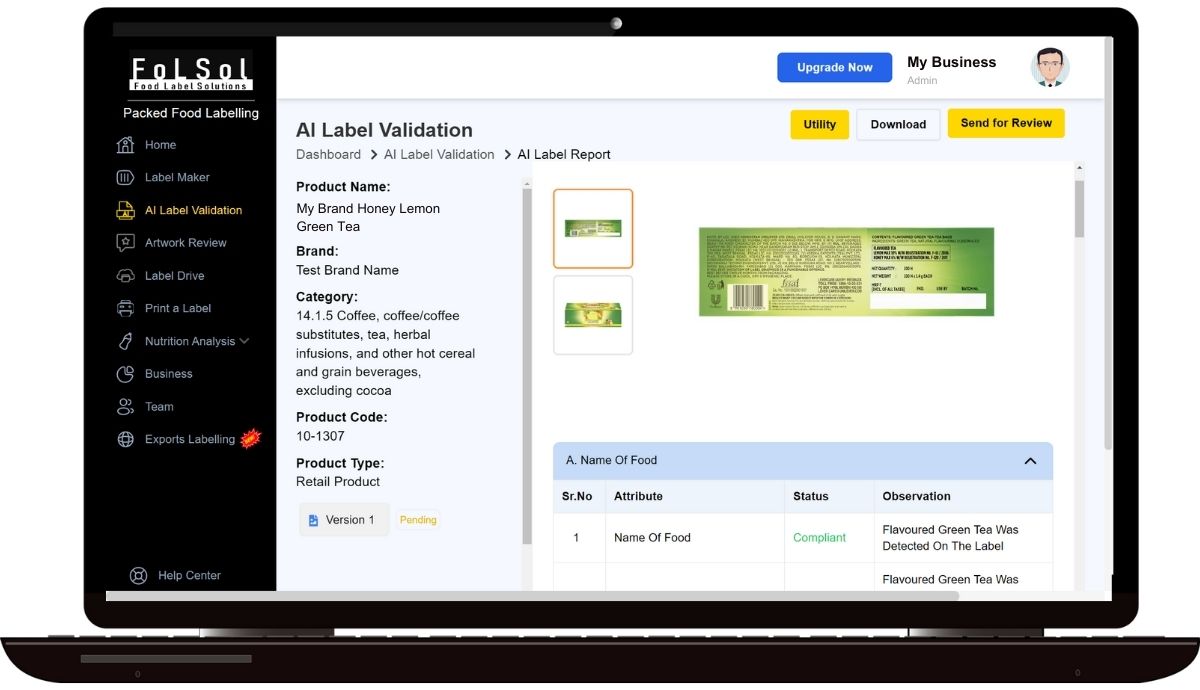Third-Party Digital Food Label Auditing using AI
August 5, 2024

Keywords: Third-party label auditing, Digital food labeling, Food industry compliance, AI label validation, FSSAI regulation compliance
International trade, global trends, product innovations, technology adoption, economic growth, and shifting consumer eating habits all contribute to a dynamic food industry landscape. This dynamic environment is further influenced by constantly evolving and proliferating food standards and regulations aimed at safeguarding consumer safety.
Diversity of food regulations puts the onus on food companies to create a safe food environment supported by policies and processes for periodic surveillance and compliance.
Do You Get Third-Party Label Audits Done for Your Business?
How Would It Be If the Role was Assigned to AI?
Have you Built a System of Digital Label Auditing for your Business?
Food labelling serves as the consumer’s first assurance of food quality and reliability, governed primarily by standards and guidelines of food safety, legal metrology, and plastic waste management.
Third Party Digital Labelling Audit using FoLSol-AI
(You don’t expect anything less from us!)
LABELBLIND® USES FOLSOL-AI FOR INDEPENDENT DIGITAL AUDITS OF LABEL ARTWORKS
Run hundreds of labels in no time
Generate label compliance reports
LABELBLIND® TEAM OF FOOD REGULATORY EXPERTS WILL DO A SECOND LEVEL CHECK FOR IN-DEPTH ANALYSIS
LABELBLIND® WORKS WITH YOU ON GAP ANALYSIS AND RECOMMENDATIONS TO STRENGTHEN COMPLIANCE WITH ACTIONABLE INSIGHTS
SUBSCRIPTION OF FOLSOL-AI EMPOWERS YOU TO RUN LABEL ARTWORKS CONTINUALLY AT YOUR CONVENIENCE
Collaborate to customize reports as per the requirements of your business
Custom parameters will come and sit over pre-existing 50+ compliance checks that FoLSol-AI is trained on
ALL DATA IS SECURED BY PRIVACY POLICIES

Need for Digital Label Auditing
Manually validating labels against numerous regulations is overwhelming, time-consuming, and prone to errors. The diversity and complexity of food regulations demand a robust solution. FoLSol-AI offers a comprehensive digital platform that integrates all regulatory requirements, leaving you with the need to run your eyes through a distilled compliance report.
Benefits of FoLSol-AI for Digital Label Auditing
Automated Validation: FoLSol-AI automates the label validation process, significantly reducing the time and effort required for manual checks.
Compliance with Multiple Regulations: The platform ensures labels comply with various regulations, including FSSAI standards and Legal Metrology requirements
Comprehensive Solution:
Pre-Packed Food Labels
Nutrition Analysis
Ingredients and Additives
Certifications: Validating logos and certifications for authenticity and accuracy.
Food Safety Audits
To strengthen the food safety surveillance system, FSSAI has envisaged audits of Food Business Operators through Private Auditing Agencies. In order to cultivate and foster the growth of compliance culture, FSSAI is enabling compliance through private recognized Auditing Agencies. Food Safety and Standards (Food Safety Auditing) Regulations, 2018 have been notified on 28th August 2018 for the same.
What are the Benefits of Third-party Food Label Validation?
Label validation ensures that food products comply with FSSAI regulations, verifying accuracy and compliance with labelling requirements. Third-party label validation holds significant importance as it offers an impartial review, independent of the manufacturer. This unbiased perspective adds credibility by ensuring that labels accurately reflect ingredients, nutritional information, and allergen warnings. It helps build consumer trust, as third-party validators verify compliance with stringent regulatory standards, ensuring transparency and reliability in food labelling practices. This process not only meets legal obligations but also enhances brand reputation through consistent and accurate product information.
Key Aspects in Food Testing and Label Validation
Ensuring accuracy in food labelling is crucial to comply with FSSAI regulations and Legal Metrology requirements. Here are the essential components of label validation that the third-party auditors will check with respect to labelling compliance:
1. Check of FSSAI Licenses:
Validators confirm the validity of FSSAI licenses displayed on products.
Ensuring adherence to the specified Kind of Business (KoB), to operate legally in the food industry.
2. Verification of Ingredient Lists and Allergen Information:
Third-party validators confirm that ingredient lists are accurate and comply with regulatory standards– i.e. the ingredients are adding in descending order of quantity, individual ingredients of a compound ingredient is declared or declaration of names of some ingredients as per the regulations such as edible oils.
Allergen information is thoroughly cross-checked against the ingredient list making sure the allergen is declared in the correct manner.
3. Accurate Nutrition Information and Claims:
Validators ensure that nutrition facts are correctly displayed and meet FSSAI guidelines. Principles of nutrition sciences are followed, for instance, the total carbohydrate values provided on label should be greater than total sugar and added sugar values, etc.
Recommended dietary allowance values, when present must be in accordance with the correct age group.
Claims pertaining the nutritional content, such as "low fat," "high fiber," or "sugar-free" are validated to prevent misleading consumers.
4. Compliance with Permitted Food Additives and Colors:
Validation includes checking if food additives and colors used are permitted to be used in the given category of the product and are also within permissible limits as per FSSAI regulations.
5. Label Validation as per FSSAI and Legal Metrology font size requirements:
Validators ensure labels adhere to specific font and logo requirements mandated by FSSAI and Legal Metrology authorities.
Compliance with size, placement, and content of mandatory label elements (e.g., veg or non-veg logo, net quantity, manufacturing date, expiry date) is verified.
6. Validation of Advertising and labelling Claims:
Claims made on labels, such as health benefits or nutritional claims, are scrutinized to verify their accuracy and compliance with regulations.
Preventing deceptive advertising practices that could mislead consumers.
7. Validation of Certifications:
Logos and certifications indicating organic, vegan, fortified etc are validated for authenticity and accuracy.
Ensuring these certifications are from recognized bodies and valid at the time of labelling.
What Rules or Regulations are these Parameters checked against?
Here’s a concise list of key regulations and what each one checks for on food labels:
Food Safety and Standards (Labelling and Display) Regulations, 2020 - Mandatory labelling information, including product name, ingredients, nutritional information, allergen declaration, and dates marking.
Food Safety and Standards (Food Product Standards and Food Additives) Regulations, 2011 - Compliance with standards for food products, including permissible additives, preservatives, and colors.
Food Safety and Standards (Health Supplements, Nutraceuticals, Food for Special Dietary Use, Food for Special Medical Purpose, Functional Food and Novel Food) Regulations, 2016 - Compliance for nutraceutical and health supplement product categories, permissible ingredients and their limits, and the accuracy of claims related to health benefits and efficacy.
Food Safety and Standards (Advertising and Claims) Regulations, 2018 - Accuracy and truthfulness of advertising claims and self-declarations related to health benefits and nutritional content.
Legal Metrology (Packaged Commodities) Rules, 2011 - Compliance with requirements for net quantity, price, and measurement units on labels.
Consumer Protection Act, 2019 - Avoidance of misleading or deceptive information on labels and ensuring transparency in product details.
Plastic Waste Management Rules, 2016 - Adherence to guidelines for plastic packaging, recycling, and waste management practices.
About LabelBlind®
Established in 2018 and based in Mumbai, LabelBlind® specialises in the area of Digitising Food Labelling and Regulatory Compliance. FoLSol® by LabelBlind® presents India’s 1st Digital Food Labelling Solution. The SaaS platform supports Food Businesses to be Labelling Compliant and Build Consumer Trust. FoLSol® by LabelBlind® is designed to strengthen the food labelling ecosystem across a wide spectrum of services including, Packed Food Labelling, Menu Labelling, Exports Labelling, Nutraceuticals and Food Supplements Labelling and Labelling for Ecommerce players. FoLSol® Digital Food Labelling Solution is fast, accurate, and cost effective. The company is ISO9001 certified in its processes.

Rashida Vapiwala (Founder at LabelBlind®, Food Label Specialist, Ph.D (Food Science and Nutrition))
Rashida is passionate about solving problems for the food industry using technology. She loves creating tech-led solutions in the space of Nutrition.
